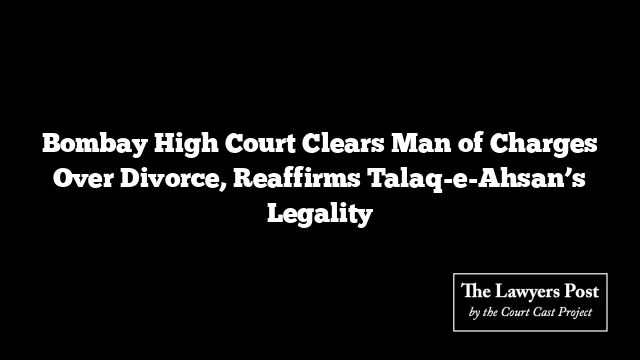In a significant ruling, the Bombay High Court has cleared a Muslim man and his parents of charges under the controversial 2019 law against instant triple talaq, affirming that the traditional form of divorce known as Talaq-e-Ahsan remains valid under Islamic law.
The court’s decision came in response to an FIR filed against the man, who had divorced his wife by following the Talaq-e-Ahsan process. This method involves a single pronouncement of talaq followed by a 90-day waiting period before the divorce takes effect, ensuring a chance for reconciliation, which distinguishes it from the banned practice of Talaq-e-Bidat—the instant triple talaq.
The case originated after the wife filed a complaint, claiming that her husband’s divorce was irrevocable and should be considered illegal under the 2019 Muslim Women (Protection of Rights on Marriage) Act. She alleged that her in-laws should also be held accountable, as they were supposedly involved in the decision.
However, the court disagreed with this view, stating that the law was specifically designed to criminalize the instant and irrevocable nature of Talaq-e-Bidat. In its judgment, the court pointed out that Talaq-e-Ahsan, with its built-in waiting period, does not fall within the law’s scope. It ruled that the FIR should be quashed, emphasizing that any attempt to prosecute the man and his family was an abuse of legal process.
Justice Vibha Kankanwadi and Justice Sanjay Deshmukh noted that the law only applies to Talaq-e-Bidat and cannot be extended to Talaq-e-Ahsan, which remains a legally recognized form of divorce under Muslim personal law. The court also dismissed claims under Section 34 of the Indian Penal Code, which deals with shared criminal intent, stating that such a section does not apply in this case.
In a final blow to the prosecution, the court stated that even the wife’s FIR acknowledged the use of Talaq-e-Ahsan, making it clear that the husband had followed the correct procedure. As a result, the court quashed the FIR and the charges against the man and his parents.
The decision highlights the ongoing legal distinction between Talaq-e-Ahsan and Talaq-e-Bidat and reinforces the notion that not all forms of divorce in Islamic law are subject to the same legal restrictions.





